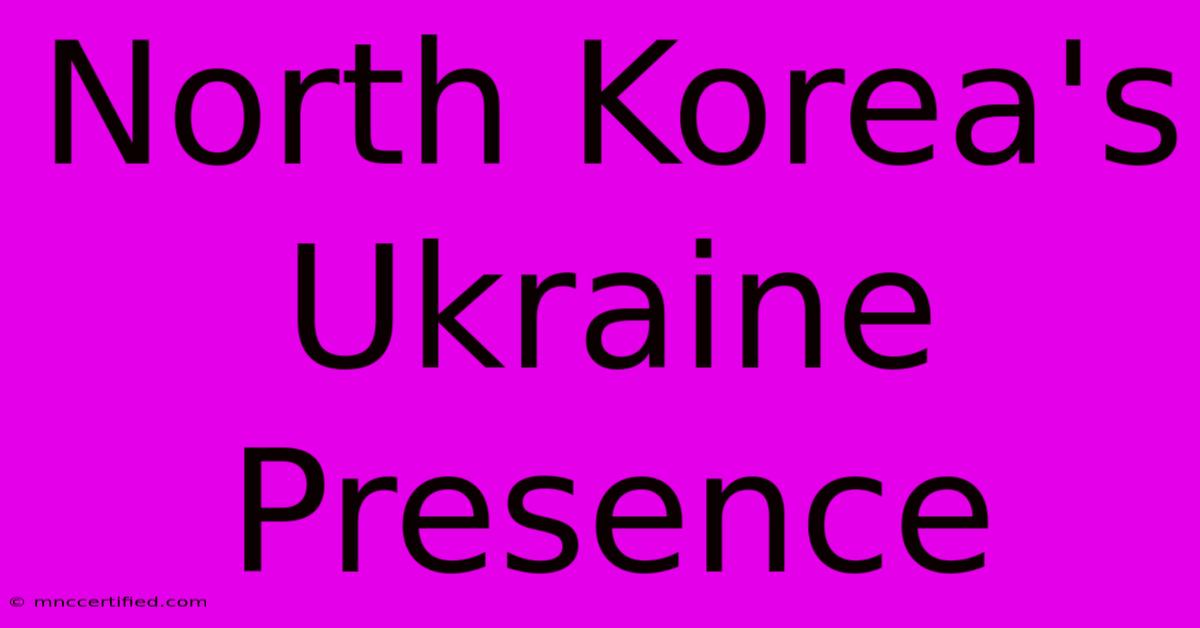North Korea's Ukraine Presence

Table of Contents
North Korea's Ukraine Presence: A Complex and Evolving Situation
North Korea's involvement in the Ukraine conflict is a multifaceted issue, shrouded in secrecy and complicated by the regime's inherent opacity. While Pyongyang has publicly voiced support for Russia and condemned the West, the extent of its direct contribution remains a subject of ongoing investigation and speculation. Understanding North Korea's actions requires examining its geopolitical motivations, its capabilities, and the potential implications for regional stability.
Deciphering Pyongyang's Stance: Public Declarations vs. Real-World Actions
North Korea's official stance on the Ukraine conflict aligns closely with Russia's narrative. State-run media consistently portrays the conflict as a product of Western aggression, framing Russia as a victim of NATO expansionism. Pyongyang has vehemently condemned Western sanctions against Russia, viewing them as an infringement on national sovereignty – a sentiment resonating deeply within the North Korean leadership. These public declarations serve several purposes:
- Solidifying the Russia-North Korea alliance: Public displays of support strengthen the already close relationship between the two nations, offering mutual benefits in terms of political solidarity and potential economic cooperation.
- Diverting international attention: By focusing on the Ukraine conflict, North Korea attempts to deflect criticism regarding its own human rights abuses and nuclear weapons program.
- Gaining leverage: Expressing support for Russia provides North Korea with a platform to negotiate better terms in future diplomatic engagements.
However, translating these pronouncements into tangible actions is challenging. While there's no conclusive evidence of direct military involvement, the possibility of indirect support cannot be entirely dismissed.
Potential Forms of North Korean Involvement:
- Arms Supplies: Reports suggest North Korea may have provided Russia with artillery shells and other munitions. Verifying these claims requires further investigation and independent confirmation. The scale and impact of any such supplies remain uncertain.
- Cyber Warfare: North Korea possesses a sophisticated cyber warfare capability, and its involvement in cyberattacks against Ukraine or its allies cannot be ruled out. Attribution in the cyber realm is notoriously difficult, making it challenging to definitively link North Korea to specific incidents.
- Propaganda and Disinformation: Pyongyang's state-controlled media actively disseminates pro-Russia propaganda, contributing to the global information warfare surrounding the conflict. This plays a significant role in shaping narratives and public opinion.
Geopolitical Motivations: Beyond Simple Alliance
North Korea's support for Russia stems from a confluence of factors beyond simple ideological alignment. These include:
- Shared antagonism towards the West: Both North Korea and Russia perceive the West as a hostile force, creating a common ground for cooperation and mutual benefit.
- Economic necessities: North Korea faces severe economic sanctions and relies on external support. Strengthening ties with Russia could provide access to resources and alleviate some economic pressures.
- Strategic considerations: By aligning with Russia, North Korea seeks to enhance its geopolitical standing and potentially gain leverage in future negotiations with the United States and other global powers.
The Implications: Regional Stability and Global Security
North Korea's involvement, even if indirect, complicates the Ukraine conflict and has broader implications for regional and global security:
- Escalation of the conflict: Any significant military assistance from North Korea could escalate the conflict and potentially draw in other nations.
- Increased sanctions pressure: Further evidence of North Korean support for Russia could lead to stricter international sanctions, further isolating the already heavily sanctioned regime.
- Strengthening authoritarian alliances: North Korea's actions reinforce the growing alignment between authoritarian regimes, posing a challenge to the international order.
Conclusion:
The extent of North Korea's presence in the Ukraine conflict remains a subject of ongoing scrutiny and debate. While public pronouncements offer a clear picture of its political alignment with Russia, the specifics of its actions remain largely unclear. Continued monitoring and investigation are essential to fully understand the implications of Pyongyang's involvement and its broader impact on global security. The complex interplay of geopolitical motivations, economic necessities, and strategic considerations makes North Korea's role in this conflict a significant area of concern for the international community.

Thank you for visiting our website wich cover about North Korea's Ukraine Presence. We hope the information provided has been useful to you. Feel free to contact us if you have any questions or need further assistance. See you next time and dont miss to bookmark.
Featured Posts
-
Spirit Airlines Bankruptcy News
Nov 19, 2024
-
Nc Commissioner Of Insurance Race
Nov 19, 2024
-
Create Gmail Aliases Shielded Emails
Nov 19, 2024
-
United Business Insurance Company
Nov 19, 2024
-
Nations League Poland Vs Scotland Live
Nov 19, 2024